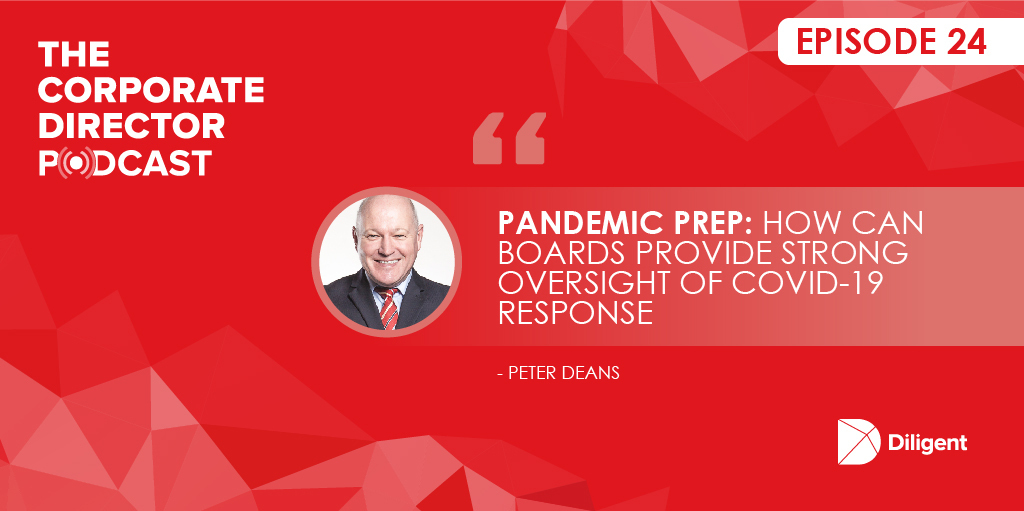Listen to Episode 24 on Apple Podcasts
Guests: Peter Deans, former Chief Risk Officer for the Bank of Queensland and director of NotWithoutRisk Consulting; and Annie Kors, Head of Research, Diligent Institute
Hosts: Dottie Schindlinger, Executive Director of the Diligent Institute, and Meghan Day, Senior Director of Board Member Experience for Diligent Corporation
In this episode:
- How do directors and executives start to get a handle on this type of crisis as it is still unfolding? Deans breaks down three distinct areas of consideration for companies in such a period of disruption and uncertainty.
- In what ways can the board lean in to better support management during times like this? Dean discusses the need for open, collaborative communication, along with the value of a skeptical eye.
- Beyond representation – are women directors taking on leadership positions on boards? A look at the findings in the latest Diligent Institute report, A Few Good Women: Gender Diversity & Inclusion in Public Company Board Leadership.
Summary:
Officially a pandemic, the impact of coronavirus is broad reaching and disruptive. For companies, your crisis response not only impacts the bottom line, it also impacts lives. Podcast guest, Peter Deans, shares with Meghan Day, Diligent’s Senior Director of Board Experience, his take on how the associated risks need to be effectively managed by boards and management.
Also in this episode, Diligent Institute Head of Research Annie Kors offers highlights from a just-released report, A Few Good Women: Gender Inclusion in Public Company Board Leadership.
How should boards classify the coronavirus outbreak?
Part of the complications surrounding this crisis is that it’s multi-faceted, with broad economic, financial and social repercussions as well as being truly global in scope. Single events, such as a natural disaster or a cybersecurity breach, tend to be contained and do not cross borders as much. This brings an entirely new set of considerations for companies.
“I don’t think anyone has the crystal ball to be able to say what will happen, but I think the best prepared boards and management teams are those that meet regularly and discuss, as events unfold, what the implications are for businesses.”
– Peter Deans, former Chief Risk Officer for the Bank of Queensland and director of NotWithoutRisk Consulting
“I don’t think anyone has the crystal ball to be able to say what will happen, but I think the best prepared boards and management teams are those that meet regularly and discuss, as events unfold, what the implications are for businesses.”
– Peter Deans, former Chief Risk Officer for the Bank of Queensland and director of NotWithoutRisk Consulting
How should boards prioritize crisis response?
Dean recommends three distinct areas of focus. First and foremost for any company should come employee safety and business continuity. In this instance, it’s likely that larger organizations may be better prepared, so directors at smaller organizations may need to provide more oversight and guidance around the immediate continuation of business activities.
Second is managing the ongoing business and financial impact. Deans urges boards to ask, “What is the ongoing business impact if this does continue for a number of months, or perhaps through the rest of calendar year 2020? And then what’s the financial impact of that business disruption and economic slowdown, or perhaps a pause in economic activity?” This line of questioning needs to happen concurrently.
“I think for boards and management teams, it’s a matter of quickly thinking about the scenarios that might pan out, what impact there might be to demand.”
– Peter Deans, former Chief Risk Officer for the Bank of Queensland and director of NotWithoutRisk Consulting
“I think for boards and management teams, it’s a matter of quickly thinking about the scenarios that might pan out, what impact there might be to demand.”
– Peter Deans, former Chief Risk Officer for the Bank of Queensland and director of NotWithoutRisk Consulting
Last, a different playbook is needed for assessing the longer-term impact and potential economic fallout. Will there be a slowdown or a recession – and for what duration? Will there be financial and economic support for certain business sectors? He recommends taking a cue from the financial services space and start to regularly stress test your balance sheet.
How can boards better support management during the crisis response?
Dean recommends opening up the lines of communication between boards and management and acting as nimbly and flexible as possible. He says, “There needs to be the ability and willingness of boards to meet quickly when events like this unfold.”
In addition to helping to support stress testing and scenario planning, Deans advises board members to embrace the ‘black hat’ and be as skeptical as possible – there’s just too much at stake to get it wrong.
Gender diversity and inclusion on public company boards
Few governance issues have grabbed the spotlight as the push for gender parity in the boardroom. Much research has been conducted to examine the gap to goal, but what happens when women do take a seat at the table? Diligent Institute sought to examine gender diversity and inclusion in its latest report, A Few Good Women: Gender Inclusion in Public Company Board Leadership.
The report revealed that:
- 21% of board committee chairs are women, almost equal to the percentage of women on boards overall
- Women directors reach leadership roles 1.7 years faster than male counterparts
- 25% of audit committee members are women, often considered the most demanding board committee
Episode resources:
- Pandemics: The Convergence of Business Disruption & Economic Slowdown
- NACD Board Lens: Confronting COVID-19
- 3 Ways Businesses Must Prepare for Coronavirus
- How Companies Can Respond to the Coronavirus
- What the Coronavirus Could Mean for the Global Economy
- World Health Organization Coronavirus disease (COVID-19) advice for the public
- A Few Good Women: Gender Inclusion in Public Company Board Leadership


